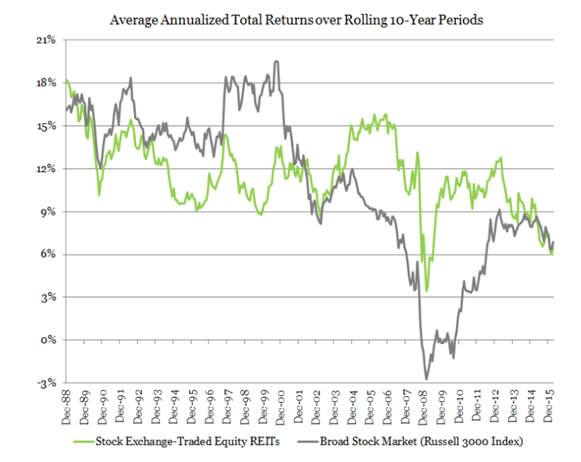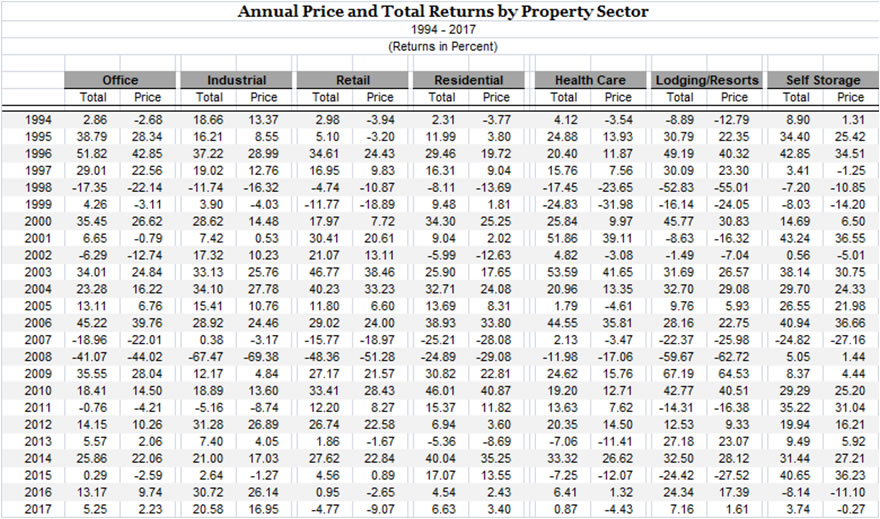Introduction to REIT Investments
What is REITs
REITs, or real estate investment trusts, are companies that own or finance income-producing real estate in a range of property sectors. Most REITs trade on major stock exchanges while some are privately held. REITs allow anyone to invest in portfolios of real estate assets the same way they invest in other industries – through the purchase of individual company stock or through a mutual fund or exchange traded fund (ETF). Most REITs operate along a straightforward business model: By leasing space and collecting rent on its real estate, the company generates income which is then paid out to shareholders in the form of dividends. REITs must pay out at least 90 percent of their taxable income to shareholders—and most pay out 100 percent.
Under the Tax Cuts and Jobs Act of 2017, though, REITs have been afforded a new tax preference: the IRC Section 199A deduction for “pass-through” businesses, that allows for a 20% deduction of any qualified REIT dividends against that very income, resulting in an effective 20% reduction in the tax rate on REITs (where the top 37% tax rate becomes “just” 29.6% instead).
Types of REITs
- Equity REITs - The majority of REITs are publicly traded equity REITs. Equity REITs own or operate income-producing real estate. The market and Nareit often refer to equity REITs simply as REITs.
- Mortgage REITs – mREITs provide financing for income-producing real estate by purchasing or originating mortgages and mortgage-backed securities and earning income from the interest on these investments.
- Public Non-listed REITs – PNLRs are registered with the SEC but do not trade on national stock exchanges.
- Private REITs – Private REITs are offerings that are exempt from SEC registration and whose shares do not trade on national stock exchanges.
REIT Sectors
Office REITs
Office REITs own and manage office real estate and rent space in those properties to tenants. Those properties can range from skyscrapers to office parks. Some office REITs focus on specific types of markets, such as central business districts or suburban areas. Some emphasize specific classes of tenants, such as government agencies or biotech firms.
Industrial REITs
Industrial REITs own and manage industrial facilities and rent space in those properties to tenants. Some industrial REITs focus on specific types of properties, such as warehouses and distribution centers. Industrial REITs play an important part in e-commerce and are helping to meet the rapid delivery demand.
Retail REITs
Retail REITs own and manage retail real estate and rent space in those properties to tenants. Retail REITs include REITs that focus on large regional malls, outlet centers, grocery-anchored shopping centers and power centers that feature big box retailers. Net lease REITs own freestanding properties and structure their leases so that tenants pay both rent and the majority of operating expenses for a property.
Lodging REITs
Lodging REITs own and manage hotels and resorts and rent space in those properties to guests. Lodging REITs own different classes of hotels based on features such as the hotels’ level of service and amenities. Lodging REITs’ properties service a wide spectrum of customers, from business travelers to vacationers.
Residential REITs
Residential REITs own and manage various forms of residences and rent space in those properties to tenants. Residential REITs include REITs that specialize in apartment buildings, student housing, manufactured homes and single-family homes. Within those market segments, some residential REITs also focus on specific geographical markets or classes of properties.
Timberland REITs
Timberland REITs own and manage various types of timberland real estate. Timberland REITs specialize in harvesting and selling timber.
Health care REITs
Health care REITs own and manage a variety of health care-related real estate and collect rent from tenants. Health care REITs’ property types include senior living facilities, hospitals, medical office buildings and skilled nursing facilities.
Self-storage REITs
Self-storage REITs own and manage storage facilities and collect rent from customers. Self-storage REITs rent space to both individuals and businesses.
Infrastructure REITs
Infrastructure REITs own and manage infrastructure real estate and collect rent from tenants that occupy that real estate. Infrastructure REITs’ property types include fiber cables, wireless infrastructure, telecommunications towers and energy pipelines.
Data center REITs
Data center REITs own and manage facilities that customers use to safely store data. Data center REITs offer a range of products and services to help keep servers and data safe, including providing uninterruptable power supplies, air-cooled chillers and physical security.
Diversified REITs
Diversified REITs own and manage a mix of property types and collect rent from tenants. For example, diversified REITs might own portfolios made up of both office and industrial properties.
Specialty REITs
Specialty REITs own and manage a unique mix of property types and collect rent from tenants. Specialty REITs own properties that don’t fit within the other REIT sectors. Examples of properties owned by specialty REITs include movie theaters, casinos, farmland and outdoor advertising sites.
Long Term Performance of REITs vs Stock Market

From Dec. 31, 1978, through March 31, 2016, total returns for exchange-traded U.S. Equity REITs have averaged 12.87 percent per year compared to just 11.64 percent per year for stocks. In addition to better long term performs, REITs also experience smaller volatility.
Performance Comparison of Different REIT Sectors

It can be seen from the table that residential and self storage REITs deliver the best long term performance with lowest volality.
 flashpeak.com
flashpeak.com
